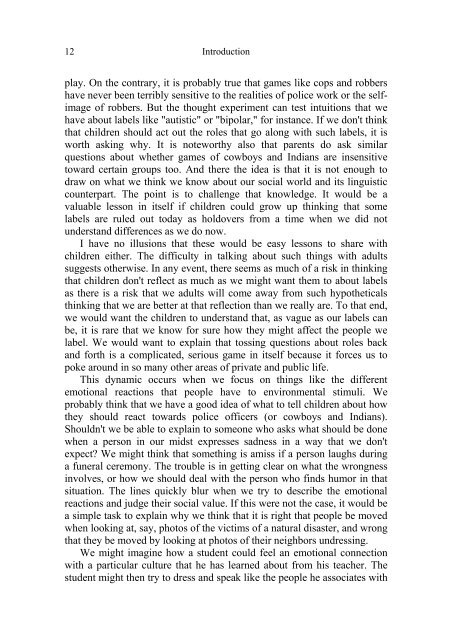978-1-4438-4527-4-sample
978-1-4438-4527-4-sample
978-1-4438-4527-4-sample
You also want an ePaper? Increase the reach of your titles
YUMPU automatically turns print PDFs into web optimized ePapers that Google loves.
12<br />
Introduction<br />
play. On the contrary, it is probably true that games like cops and robbers<br />
have never been terribly sensitive to the realities of police work or the selfimage<br />
of robbers. But the thought experiment can test intuitions that we<br />
have about labels like "autistic" or "bipolar," for instance. If we don't think<br />
that children should act out the roles that go along with such labels, it is<br />
worth asking why. It is noteworthy also that parents do ask similar<br />
questions about whether games of cowboys and Indians are insensitive<br />
toward certain groups too. And there the idea is that it is not enough to<br />
draw on what we think we know about our social world and its linguistic<br />
counterpart. The point is to challenge that knowledge. It would be a<br />
valuable lesson in itself if children could grow up thinking that some<br />
labels are ruled out today as holdovers from a time when we did not<br />
understand differences as we do now.<br />
I have no illusions that these would be easy lessons to share with<br />
children either. The difficulty in talking about such things with adults<br />
suggests otherwise. In any event, there seems as much of a risk in thinking<br />
that children don't reflect as much as we might want them to about labels<br />
as there is a risk that we adults will come away from such hypotheticals<br />
thinking that we are better at that reflection than we really are. To that end,<br />
we would want the children to understand that, as vague as our labels can<br />
be, it is rare that we know for sure how they might affect the people we<br />
label. We would want to explain that tossing questions about roles back<br />
and forth is a complicated, serious game in itself because it forces us to<br />
poke around in so many other areas of private and public life.<br />
This dynamic occurs when we focus on things like the different<br />
emotional reactions that people have to environmental stimuli. We<br />
probably think that we have a good idea of what to tell children about how<br />
they should react towards police officers (or cowboys and Indians).<br />
Shouldn't we be able to explain to someone who asks what should be done<br />
when a person in our midst expresses sadness in a way that we don't<br />
expect? We might think that something is amiss if a person laughs during<br />
a funeral ceremony. The trouble is in getting clear on what the wrongness<br />
involves, or how we should deal with the person who finds humor in that<br />
situation. The lines quickly blur when we try to describe the emotional<br />
reactions and judge their social value. If this were not the case, it would be<br />
a simple task to explain why we think that it is right that people be moved<br />
when looking at, say, photos of the victims of a natural disaster, and wrong<br />
that they be moved by looking at photos of their neighbors undressing.<br />
We might imagine how a student could feel an emotional connection<br />
with a particular culture that he has learned about from his teacher. The<br />
student might then try to dress and speak like the people he associates with


